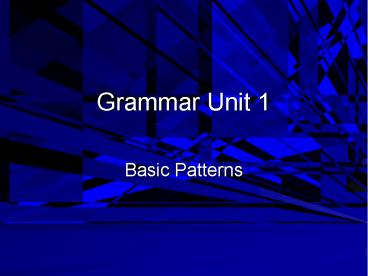Grammar Unit 1 PowerPoint PPT Presentation
Title: Grammar Unit 1
1
Grammar Unit 1
- Basic Patterns
2
Simple subject and predicates
- Subjectdoer of sentence
- Predicateverb the act of the doer
- Examples Mary sang at our concert.
- Find subject and predicate
- Mary is the subject
- Sang is the predicate
3
Simple SP cont
- Simple Subjectthe doer with no phrases or
modifiersjust the noun(s) - Simple predicatethe verb with no modifiers
- Example A plate of cookies enticed him to eat.
- Example Joe played in the park.
4
Compound subjects and predicates
- A sentence can have more than one subject and
more than one predicate - Example John and his friend went to the game.
- Example Bob stood in the aisle and spoke loudly.
5
Commands
- In commands, the subject of the sentence is
usually understood. - Example Wash the dishes. You wash the dishes.
- Example Stop and listen. You stop and listen.
6
Practice
- Find the simple subject and simple predicate.
- Pete and Jim skated all weekend.
- Jerry walked to the Oaks Mall.
- Come in from the rain.
- Her mother left in anger.
- Jim spoke clearly and forcefully.
- Jane writes well.
7
First Basic Pattern Subject, Intransitive Verb
- Intransitive Verb A verb that is complete in
itself. Does not need another word to complete
its meaning. - Example John jumped into the water.
- John jumped is a complete sentence. Jump is an
intransitive verb. - Example Beth ran in the marathon last month.
8
Modifiers
- Verbs can have modifiersAdverbs
- A verb or phrase that modifies the verb answers
the questions how, when, where, why, or how much
(to what extent) - Example Jack left later.
- Example I jumped on my bed.
9
Practice
- Identify the word or phrase that modifies the
verb and identify the simple subject and
predicate. - My fountain pen writes better every day.
- The leaf drifted slowly to the ground.
- Robert painted in the dark.
- Jane swam in Jacks swimming pool.
- She works for money.
10
Second Basic Pattern Subject, Transitive Verb,
Direct Object
- Transitive Verb a verb that is not complete in
itself needs a noun or a pronoun to complete it
called a direct object. - Direct object for a transitive verb always
answers the questions what or whom - A complement is not a modifier. It has to be
part of the basic pattern.
11
For instance
- If someone said to you, Yesterday, I bought.
You would probably ask, What did you buy? - Bought, in this sentence, is not an intransitive
verb. It needs a direct object.
12
Practice
- Identify the basic pattern 2 for the following
sentences (subject, transitive verb, direct
object) - My sister bought a new dress yesterday.
- Finish your homework.
- She broke her arm during practice.
- Take this book to the library.
- Debra lost an earring during the dance.
13
Compound Predicates and Basic Pattern 2
- A compound predicate occurs when the sentence has
more than one verb. In the same sentence, one
verb can be transitive and one can be
intransitive. - Example Bill left early and took a bouquet of
roses to his girlfriend.
14
Compound Direct Objects
- Sometimes a transitive verb can have more than
one direct object - Example Joan took paper and pencils to the exam
on Saturday.
15
Practice
- Identify the basic pattern for the following
sentences. - Our old car needs a thorough overhauling.
- Wash the windows and woodwork in your room.
- Greg ordered two hamburgers and fries.
- My brother borrowed Dads car and went to a
dance.
16
Active and Passive Voice
- Voice shows how a verb speaks. A voice is active
when the doer performs the act. - Paul wrote on the blackboard.
- A voice speaks passively when the doer receives
the action. - The sweater was torn by Margaret.
17
Practice
- Rewrite the following sentences in active voice.
- The solo was sang beautifully by Jane.
- My brother was grabbed by the bully.
- A message was sent by Ted to his brother.
18
Third Basic Pattern Subject, Linking Verb,
Subject Complement
- Linking verb links the subject with its
complement - Referred to as a state-of-being verb it does
not act - State-of-being verbs am, is, are, was, were, be,
been - The complement of a linking verb refers back to
the subject - Example The captain is Tom.
19
Complements
- The complement of a linking verb can be a noun,
pronoun, or an adjective - Find the complements
- Jerry is an excellent swimmer.
- Jerry is he.
- Jerry is happy.
20
Transitive Verbs vs. Linking Verbs
- Molly won the tennis tournament.
- Pattern Molly won tournament
- Tournament completes verb, not subject
- Molly was a tennis champion.
- Pattern Molly was champion
- Molly and champion are the same
- Champion complements Molly, not the verb
21
Some practice
- Look at the following sentences
- Brian played ball in the park.
- Ball complements?
- Sally wrote a letter to her aunt.
- Letter complements?
- Jim is a good math student.
- Student complements.
22
State-of-being Verbs
- Most common linking verbs are forms of to be am,
is, are, was, were, be, been - To be linking, the verb must link. I
- No linking, then the verb is intransitive
- Example Mary was in her room. (not linking)
- Example Mary was a teacher. (linking)
23
Practice
- Determine if the state-of-being verbs in the
following sentences are linking verbs or
intransitive verbs. - I will be famous.
- The flowers were beautiful.
- Jeff was working for my father.
- The books were taken to the library.
- My father was chief engineer.

